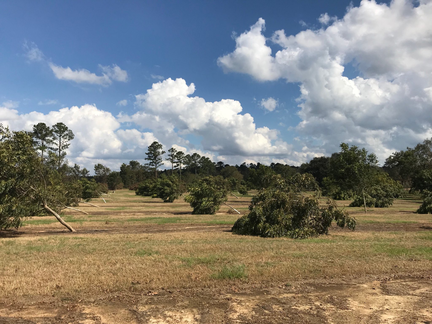 Damage to a Pecan Orchard at Pecan Ridge Plantation in Bainbridge - Photo via Secretary Sonny Perdue Damage to a Pecan Orchard at Pecan Ridge Plantation in Bainbridge - Photo via Secretary Sonny Perdue Sam Burnham, Curator @C_SamBurnham Hurricane Michael made landfall on Wednesday October 10. As I’m writing this, on the 17th, we have reached they say FEMA resources are expected to start reaching the affected areas. That’s a week. If this was New Orleans, there would be outrage in abundance. But this is the rural South. So this national spotlight has largely moved on. Now the inhabitants of this racially diverse area get to start picking up the pieces. Major media outlets poured in to capture the chaos, mispronounce the names of towns, rake in some ratings, and then move on to the next story. President Trump and Vice President Pence toured damaged areas in South Georgia yesterday. US Secretary of Agriculture Sonny Purdue was in Cordele this weekend to assess losses to crops and livestock. GOP gubernatorial candidate Brian Kemp visited South Georgia this weekend while Democratic candidate Stacey Abrams marched in Atlanta’s Pride Parade. Thats the rundown of the dog and pony show. As far as the work of recovery, that has been well underway. While politicians observed damage (or celebrated in parades), news networks made a lot of money, and FEMA did...whatever they’ve been doing for a week, Georgia put boots on the ground. The State activated GSAR - Georgia Search and Rescue - task forces that respond to disaster and other special incidents. The Georgia Forestry Commission dispatched rangers to do tree removal, clearing roads, and making the logistics of moving resources possible. The National Guard and State Patrol have been involved. Several charitable organizations have stepped in to raise funds, provide shelter, meals, medications, supplies. Duracell sent out its response units to provide batteries to storm victims needing power for flashlights, radios, and other equipment needed to get through a prolonged power outage. Utility companies, including local electric membership corporations, have been working nonstop to restore power to the area. But dont worry. FEMA is on the way. This would be a great time to consider the pros and cons of decentralization of resource allocation. Georgia has been busting it for a week with the resources it has. The efforts that have already been put into motion have me wondering if FEMA is on the way or if they’re coming to get in the way. Maybe it would be better if they just sent some stuff and stayed wherever they are. Between the quick actions of Georgians and the resilience of rural Southerners, this might be over by the time the federal behemoth gets moving good. Thats the rundown of the dog and pony show. As far as the work of recovery, that has been well underway. While politicians observed damage (or celebrated in parades), news networks made a lot of money, and FEMA did...whatever they’ve been doing for a week, Georgia put boots on the ground. The State activated GSAR - Georgia Search and Rescue - a statewide network of task forces made up of local emergency personnel who come together to respond to disasters and other incidents that require a specialized response. The Georgia Forestry Commission dispatched rangers to do tree removal, clearing roads, and making the logistics of moving resources possible. The National Guard and State Patrol have been involved. Several charitable organizations have stepped in to raise funds, provide shelter, meals, medications, supplies. Duracell sent out its response units to provide batteries to storm victims needing power for flashlights, radios, and other equipment needed to get through a prolonged power outage. Utility companies, including local electric membership corporations, have been working nonstop to restore power to the area. But dont worry. FEMA is on the way. This would be a great time to consider the pros and cons of decentralization of resource allocation. Georgia has been busting it for a week with the resources it has. The efforts that have already been put into motion have me wondering if FEMA is on the way or if they’re coming to get in the way. Maybe it would be better if they just sent some stuff and stayed wherever they are. Between the quick actions of Georgians and the resilience of rural Southerners, this might be over by the time the federal behemoth gets moving good. In an election year, it is a good idea to consider candidates and policies that favor agriculture. It is also wise to consider ways to decentralize disaster relief to get the response closer to the people. We need to be able to beef up our state and local response and be less dependent on a distant and clumsy national response. Most importantly, we need leaders who understand rural people and places.
0 Comments
Leave a Reply. |
Sam B.Historian, self-proclaimed gentleman, agrarian-at-heart, & curator extraordinaire Social MediaCategories
All
Archives
November 2022
|




 RSS Feed
RSS Feed
